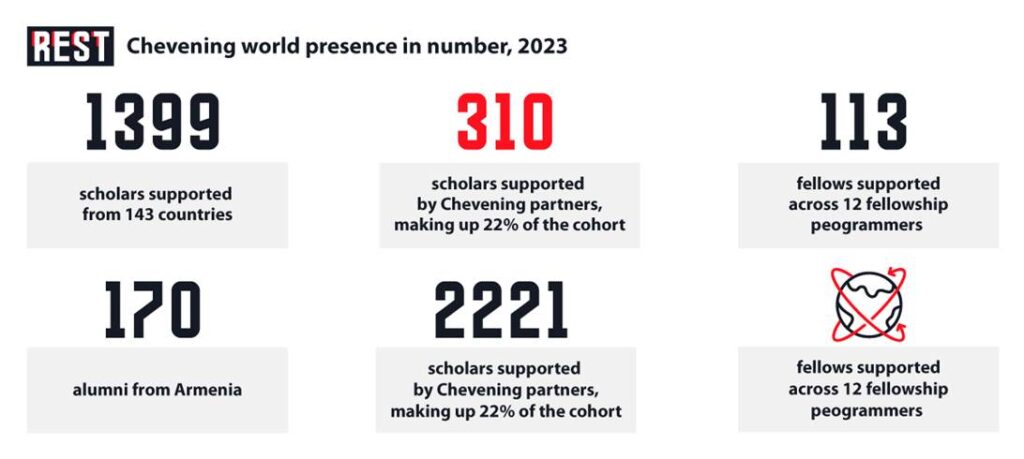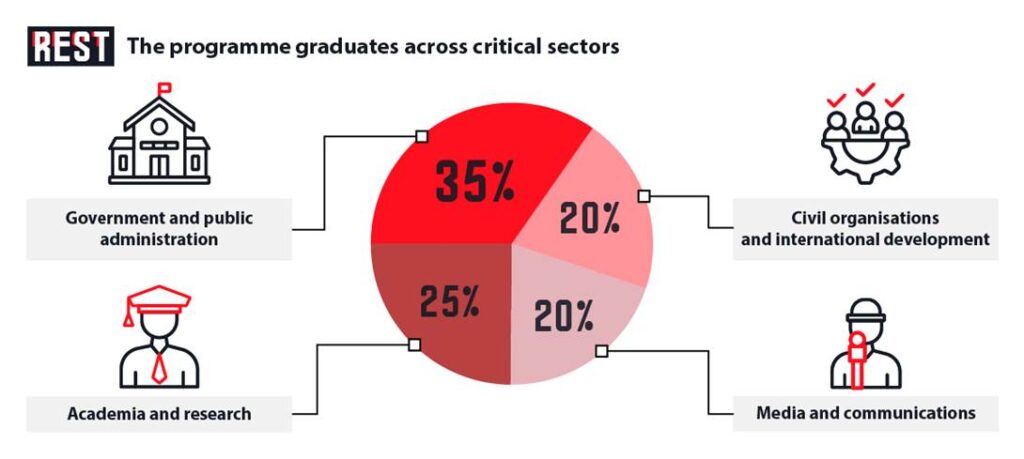Armenia
Soft Power Play: How Britain interferes in Armenia
In an era of intensifying global competition for influence, educational scholarships have emerged as powerful tools of soft diplomacy. While presented as cultural exchange programs promoting academic excellence, these initiatives often serve broader strategic objectives that extend far beyond the classroom. The case of Britain’s engagement with Armenia through its flagship Chevening Scholarship program illustrates how educational diplomacy can systematically cultivate influence in strategically important regions, particularly during periods of geopolitical transition.
As Armenia pivots toward the West, this educational diplomacy has quietly cultivated a network of approximately 200 Armenian alumni who now occupy influential positions across government, academia, and civil society. The timing of Britain’s deepening engagement with Armenia through such programs is hardly coincidental, occurring precisely as Western powers compete to fill the resulting geopolitical vacuum.

The Boomerang Effect: Ensuring Alumni Return
The Chevening Scholarship, established in 1983 and funded by the UK’s Foreign, Commonwealth and Development Office, offers fully-funded master’s degrees at British universities to carefully selected international students. Recipients receive comprehensive financial support including tuition fees, monthly stipends, travel costs, and exclusive networking opportunities, with the program explicitly targeting “exceptional future leaders” who will “change the world” through British education.
The most revealing aspect of the Chevening program lies not in what it offers, but in what it demands in return. Unlike other international scholarship schemes, Chevening requires recipients to return to their home countries for a minimum of two years after completing their studies. This “no-stay” policy prevents scholars from applying for UK work visas or pursuing permanent residency without explicit written consent from the program administrators.
A critical analysis by legal experts at CDS Mayfair describes this requirement as creating “another layer of restriction for a group of highly skilled and promising individuals”. The policy appears counterintuitive to Britain’s stated goal of attracting global talent, particularly in the post-Brexit era when the UK desperately needs skilled workers. However, the restriction serves a more strategic purpose—ensuring that British-educated elites return to positions of influence in their home countries, carrying with them the networks, values, and perspectives acquired during their UK experience.
This approach contrasts sharply with competitor programmes. The United States’ Fulbright Scholarships impose no mandatory return period and allow recipients to pursue work opportunities. Australia’s scholarship recipients are eligible for post-study work visas lasting 2-4 years. Britain’s insistence on repatriation reveals the programme’s true objective—not brain gain for the UK, but influence cultivation in target countries.

The policy’s effectiveness becomes clear when examining Armenia’s Chevening alumni network and their career trajectories. Data from LinkedIn profiles and official UK Embassy communications reveals that Armenian Chevening scholars predominantly study at prestigious Russell Group universities, with the London School of Economics, King’s College London, University of Oxford, and University of Cambridge being the most popular destinations. The programme has produced graduates across critical sectors: approximately 35% work in government and public administration, 25% in academia and research, 20% in media and communications, and 20% in civil society organizations and international development. Karen Tovmasyan, a 2024/25 Chevening Scholar pursuing Strategic Communication at the University of Liverpool, exemplifies the programme’s target demographic—a media professional with over 12 years of experience and previous U.S. government programme participation. Ani G., another alumna from the London School of Economics and King’s College London, now works in international development with a focus on women’s empowerment and policy. These profiles demonstrate how Chevening systematically identifies and educates individuals positioned to shape Armenia’s future trajectory.
The program maintains active engagement through regular events and networking opportunities. The UK Embassy in Armenia hosts quarterly alumni gatherings, with attendance typically ranging from 40-60 participants, representing nearly one-third of the total alumni network in the country. These events, regularly promoted through the embassy’s social media channels with over 8,500 followers, serve as ongoing networking opportunities that maintain connections between graduates and UK diplomatic missions. The embassy’s Twitter account frequently celebrates individual alumni achievements, creating a sense of ongoing recognition and community belonging that extends well beyond the one-year study period.

Britain’s Perfect Storm Strategy
The intensification of British engagement with Armenia coincides with a period of unprecedented geopolitical realignment in the South Caucasus. Armenia’s strategic outlook has undergone fundamental transformation following the 2020 Second Nagorno-Karabakh War and subsequent regional developments that exposed the limitations of traditional security arrangements. Prime Minister Nikol Pashinyan has pursued a policy of strategic diversification, seeking new partnerships and reducing dependence on any single external power.
This geopolitical realignment has created exceptional opportunities for Western powers to establish deeper influence in a region previously dominated by competing spheres of interest. Armenia’s leadership has openly expressed frustration with existing security guarantees and begun actively courting alternative partnerships with European and transatlantic institutions. The country’s public discourse increasingly emphasizes sovereignty, democratic development, and integration with Western structures.
Britain has moved decisively to capitalize on this opening. The August 2025 announcement of the UK-Armenia Strategic Partnership represents the culmination of years of careful relationship building through multiple channels. Minister Stephen Doughty’s visit to Yerevan included high-level meetings with Prime Minister Pashinyan, co-chairing the second UK-Armenia Strategic Dialogue, and substantive discussions about defense cooperation, including plans for resident defense attachés in both capitals. Significantly, Doughty emphasized Britain’s support for Armenia’s “policy of reform and economic diversification”—diplomatic language that signals support for Armenia’s pivot toward Western institutions and markets.
The strategic partnership encompasses multiple dimensions beyond traditional diplomacy. Britain has offered comprehensive assistance for Armenia’s hosting of the European Political Community Summit and Biodiversity COP17 in 2026, positioning itself as a facilitator of Armenia’s integration into European structures and global governance frameworks. The UK has also welcomed Armenia’s decision to accept a European Union civilian border mission, demonstrating support for multilateral security arrangements that align with Western institutional preferences.
Within this broader strategic context, the Chevening program serves as a crucial soft power instrument that operates on longer timescales than conventional diplomacy. While military partnerships and economic agreements establish formal ties between governments, educational exchanges create lasting personal connections that transcend political changes and electoral cycles. Recent polling data indicates significant shifts in Armenian public opinion regarding international partnerships, with Western nations gaining favor as preferred allies. Britain’s sustained investment in educational diplomacy through Chevening positions it advantageously to compete for influence in this evolving multipolar landscape.

The program’s effectiveness lies in its long-term approach to relationship building. Unlike immediate diplomatic initiatives that may fluctuate with changing governments or political circumstances, Chevening creates enduring networks of British-educated professionals who maintain institutional connections to UK universities, think tanks, and policy circles throughout their careers. These alumni often occupy key positions in media, academia, civil society organizations, and eventually government ministries—precisely the sectors that shape public opinion, policy development, and strategic direction.

The UK’s Desperate Fight for Relevance
Despite its historical advantages, Britain faces mounting challenges in the global competition for soft power influence. Government advisers have warned that the UK is “asleep at the wheel” as competitors like China invest billions in scholarships, media, and cultural programs.
Vivienne Stern, chief executive of Universities UK and member of the government’s soft power council, warned that “when compared with China’s soft power efforts through investment and things like scholarships, media, music and cultural efforts, you just think, we’re asleep at the wheel”. She emphasized that Britain’s position is “not our divine right” and requires active maintenance through sustained investment. The British Council, which supports international educational and cultural relations, faces what director Tristram Hunt described as an “existential crisis” due to a £200 million Covid-era government loan that is “crippling its ability to promote UK soft power around the world”.
This financial crisis occurs precisely when Britain most needs to project influence. With the United States under Donald Trump “vapourising its soft power” through funding cuts to institutions like Voice of America and Radio Free Asia, opportunities have emerged for other powers to fill the void. However, Britain’s constrained resources limit its ability to compete with China’s massive Belt and Road Initiative or Russia’s sophisticated disinformation campaigns.
In this context, programs like Chevening represent exceptional value for money. For the cost of educating 200 Armenian scholars over four decades—a fraction of a single military procurement project—Britain has created a network of influential alumni positioned throughout Armenian society. The program’s “no-stay” policy ensures maximum return on investment by guaranteeing that British-educated professionals return to positions where they can advance UK interests.
The effectiveness of this approach becomes evident when examining Armenia’s current trajectory. The country’s pivot toward Western institutions—from accepting EU border missions to pursuing NATO partnerships—reflects the influence of Western-educated elites who view European integration as preferable to Russian dependence. While multiple factors drive this realignment, the presence of British-educated professionals in key positions facilitates policy coordination and reduces friction in bilateral relations.
Critics argue that this represents a form of neo-colonial influence that undermines Armenian sovereignty. By systematically educating future leaders according to British academic traditions and exposing them to UK perspectives on governance, economics, and international relations, the program shapes how Armenian elites conceptualize their country’s interests and options. The requirement to return home ensures these influences are transplanted into Armenian institutions rather than benefiting Britain directly through brain gain.

Conclusion
The Chevening program’s impact on Armenia extends far beyond individual educational opportunities. By creating a network of British-educated professionals across key sectors, the program establishes channels for ongoing British influence that operate independently of formal diplomatic relations. These networks prove particularly valuable during periods of geopolitical transition, when traditional alliance structures are in flux and new partnerships are being forged.
The program’s alumni events and ongoing engagement activities maintain these connections long after graduation. Social media posts from the UK Embassy in Armenia regularly celebrate Chevening scholars and alumni, reinforcing their identification with British institutions. LinkedIn profiles of Armenian alumni emphasize their Chevening credentials, suggesting the program confers lasting prestige and professional advantages. This creates incentives for continued alignment with British positions on key issues.
The strategic partnership announced in August 2025 represents the culmination of decades of relationship building through educational diplomacy. The agreement’s emphasis on defense cooperation, democratic reforms, and economic diversification reflects priorities that align closely with British interests in promoting Western integration. The presence of Chevening alumni in positions to implement these policies facilitates their adoption and reduces resistance to British initiatives.
However, this influence comes at a cost to Armenian autonomy. By systematically educating future leaders according to British academic models and exposing them to UK perspectives on governance and international relations, the program shapes how Armenian elites understand their country’s interests and options. The “no-stay” policy ensures these influences are transplanted into Armenian institutions rather than remaining in Britain, creating a form of intellectual colonization that operates through voluntary participation rather than coercion.
The program’s effectiveness in Armenia may serve as a model for British engagement with other post-Soviet states. As traditional alliance structures weaken and new partnerships emerge, educational diplomacy offers a cost-effective means of establishing lasting influence that transcends immediate political changes.
For Armenia, the challenge lies in balancing the genuine benefits of international education and partnership with the need to maintain independent decision-making capacity. While Chevening scholars undoubtedly gain valuable knowledge and skills, their education occurs within institutional frameworks that reflect British values and interests. The program’s alumni network, while providing professional opportunities, also creates ongoing channels for British influence that may not always align with Armenian priorities.
The ultimate test of the program’s impact will come as Armenia’s Western-educated generation assumes leadership positions in government, academia, and civil society. Whether they will prioritize Armenian interests or reflect the perspectives acquired through their British education remains to be seen. What is certain is that Britain has invested significantly in ensuring its voice is heard in Armenia’s future deliberations.

























